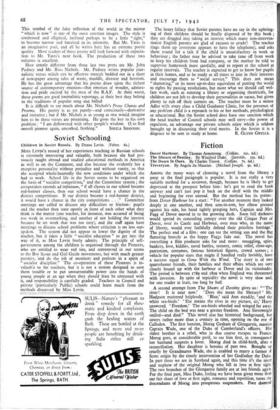Soviet Schooling
Children in Soviet Russia. By Deana Levin. (Faber. 6s.)
Miss LEVIN'S record of her experiences teaching in Russian schools is extremely interesting and valuable, both because she had pre- viously taught abroad and studied educational methods in America as well as on the Continent, and also because she evidently has a receptive personality without prejudice and without vanity, so that she accepted whole-heartedly the new conditions under which she had to work. School life in the Soviet seems to be organised on the basis of "socialist competition," and the Committee system ; the co:npetition extends ad infinitum," if all classes in our school became red-banner classes, then our school would have a chance in the district competitions. If our district became a red-banner district, it wou:d have a chance in the city competitions. . . ." Committee meetings are called to discuss any difficulties or friction: pupils and the teacher then state openly in front of each other what they think is the matter (one teacher, for instance, was accused of being too weak in overmarking, and another of not holding the interest because he set work that was too easy), and the staff again have meetings to discuss school problems where criticism is no less out- spoken. The system did not appear to lower the dignity of the teacher, but it takes a little "socialist education" to get into the way of it, as Miss Levin freely admits. The principle of self- government among the children is organised through the Pioneers, who are entitled to wear red ties, and correspond in our terms to the Boy Scout and Girl Guide movements, but with much greater prestige, and do the job of monitors and prefects in a spirit of "socialist discipline." The co-operation of these Pioneers is in- valuab:e to the teachers, but it is not a system designed to save them trouble or to put unwarrantable power into the hands of young people at an age when they should least be entrusted with it, and responsibility is carefully graded. Teachers in Council and private (particularly Public) schools could learn much from the methods discussed by Miss Levin. The hoary fallacy that Soviet parents have no say in the upbring- ing of their children should be finally disposed of by this book ; they are dragged into taking an interest which many non-interven- tionist English parents are glad of excuses to evade! The teacher rings them up (everyone appears to have the telephone), and asks them round for a talk if the child is unsatisfactory in work or behaviour ; the father may be advised to take time off from work to keep his children from bad company, or the mother be told to supervise homework more carefully, and to report at the school at regular intervals. The teacher is expected to get to know her pupils in their homes, and to be ready at all times to join in their interests and encourage them to "social service." This does not mean "slumming," or its more up-to-date equivalent of putting the world to rights by passing resolutions, but more what we should call wel- fare work, such as running a library or organising theatricals, for children are not left to develop their personalities in yam°, but given plenty to rub off their corners on. The teacher must be a minor Adler with every class a Child Guidance Clinic, for the presence of any problem child iS a reproach to his or her methods, psychological or educational. But the Soviet school does have one sanction which the head teacher of Council schools may well envy—the power of expulsion, an advantage our private schools enjoy which is seldom brought up in discussing their rival merits. In the Soviet it is a disgrace to be sent to study at home. R. GLYNN GRYLLS.


























 Previous page
Previous page